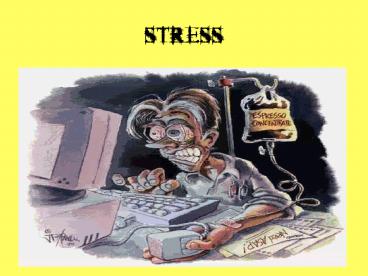STRESS - PowerPoint PPT Presentation
1 / 32
Title: STRESS
1
STRESS
2
Which of the following events can cause stress?
- A. Taking out a loan
- B. Failing a test
- C. Graduating from college
- D. Watching a football game
3
ALL FOUR!
- Stress producing factors may be pleasant or
unpleasant. - Physical challenges and the achievement of
personal goals can cause stress.
4
Moderate exercise can stimulate which of the
following?
- A. Analgesia (pain relief)
- B. Birth of new brain cells
- C. Relaxation
5
ALL THREE
- Regular exercise is linked to improvements in
many dimensions of wellness.
6
High levels of stress can impair memory and cause
physical changes in the brain.
- TRUE or FALSE statement?
7
TRUE
- Low levels of stress may improve memory but high
stress levels impair learning and memory. - Over the long-term, high stress levels may shrink
an area of your brain called the hippocampus.
8
(No Transcript)
9
For which of the following disorders is stress a
RISK FACTOR?
- A. diabetes
- B. arthritis
- C. premature menopause
- D. heart disease
10
ALL FOUR
- Stress interacts with
- Heredity
- Personality
- Social Environment
- Behavior
- Stress increases your vulnerability to health
problems
11
How many car crashes each year are caused by
drowsy driving?
- A. 10,000
- B. 100,000
- C. 200,000
12
C200,000!
- Among Drivers age 18-29, 60 report driving while
drowsy. - Nearly 25 say they have fallen asleep at the
wheel. - Driving while drowsy is nearly as dangerous as
driving while intoxicated.
13
STRESS
- Define The collective physiological and
emotional responses to any stimulus that disturbs
an individuals homeostasis. - What is HOMEOSTASIS?
14
Eustress vs. Distress
- Eustress
- Example
- Being accepted to college
- Interviewing for a job
- Going out on a date
- Being interviewed on television
- Watching a game
15
Distress
- Losing your car/house keys
- Losing your job
- Forgetting where your car is parked in the
college parking lot - Getting a speeding ticket
- Failing a test
16
Stress Level and Performance
17
Two Major Control Systems
- Nervous System
- a. brain
- b. spinal cord
- c. nerves
- Endocrine System
- a. glands
- b. tissues
- c. cells
18
Nervous System
- Autonomic Nervous System (Your Auto-pilot
system) - a. Not under conscious supervision
- b. controls digestion
- c. controls heart rate
- d. breathing
- e. blood pressure
- f. blood pressure
19
Two Divisions of Autonomic NS
- Parasympathetic
- a. in control when you are relaxed
- b. aids in digestion, energy storage and growth
promotion - Sympathetic
- a. activated during physiological arousal or
during emergency - Example severe pain, anger or fear
20
Sympathetic Nervous System
- Endocrine System Important
- System of glands, tissues and cells help control
body functions by releasing hormones and other
chemical messengers into bloodstream. - Stress hormones act only on those organs with
stress hormone receptors. This prepares body for
emergency
21
EMERGENCY!!
- Both systems work together in emergency
situations - FIGHT OR FLIGHT REACTIONS!
- Reflexive and Cognitive areas of brain sends
message that there is a threat and immediate
action is required.
22
Emergency continued
- Neurochemical messages sent to hypothalamus
(hormonal control center) - Hypothalamus sends wake up call to pituitary
gland. - Pituitary gland releases ACTH-adrenocorticotropic
hormone into bloodstream. - ACTH travels to adrenal glands (above kidneys)/
they release cortisol.
23
Emergency continued
- Simultaneously, the sympathetic nerves instruct
your adrenal glands to release epinephrine
(adrenaline). - Epinephrine triggers profound changes in your
body.
24
Epinephrine Release
- Acute hearing and vision
- Bronchi dilate to allow for more air in lungs
- Heart rate accelerates
- Blood Pressure increases allows oxygen,
nutrients and hormones to be rapidly distributed - Liver releases extra sugar to provide energy for
muscles and brain - Digestion halts
- You Perspire more for skin cooling
25
Epinephrine continued
- Endorphins released to relieve pain in case of
injury - Blood cell production increases
- All of these changes give you heightened reflexes
and strength to deal with stressor
26
Emergency Ends
- Parasympathetic System takes over and stops
reaction to allow your body systems to return to
HOMEOSTASIS.
27
Personality Types
- Type A
- Type B
- Type C
- Assessment in class
28
Type AThe Leader
- controlling, schedule driven, competitive,
hostile at times independent, direct and to the
point. - Entrepreneurs, business managers/owners
- Study by Friedman and Rosenman-White Caucasian
males more likely to have heart disease. - Later studies negated this and have shown that
type As are quite healthy and even more
successul at surviving heart disease than Type B.
29
Type A contd
- Type As associated with greater risk of heart
disease are men and women across all ethnic
backgrounds who have tendencies of anger,
cynicism and hostility. - May have higher perceived stress levels.
- Greater coping difficulties to stressors.
- May be upset and explosive by events others would
consider mild annoyances.
30
Type BThe Socializer
- Less frustrated by the flow of day-to-day events
and actions of others. - Talkative
- Outgoing
- Like to be the center of attention
- Enjoy traveling and parties
- Others enjoy being around them
- Do well in marketing, sales, advertising, public
speaking
31
Type CDetails, details
- Difficulty expressing emotion
- Anger suppression
- Very neat
- Very calculated and precise
- Introverted
- Accountant, engineer, computer programmer, analyst
32
What Personality Type are you?
- Assess your personality type by answering the
continuum questionnaire given by your instructor. - This will be your participation grade for today.
- After answering the questionnaire, take all of
your belongings and leave the room (Class is NOT
over yet!)































